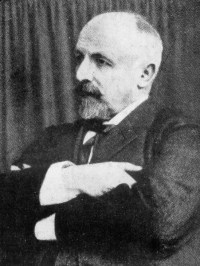

Set Theory has been a part of the mathematical world for centuries and has a deep impact on how mathematics is understood. For example, consider the Greeks' definition of a circle: The set of all points that are a fixed distance away (r) from a given point P. There are many more mathematical definitions that are formed within the context of sets.
Many a mathematician has explored the concept of infinite and finite sets and how to classify them. Sets play a major role in how we define certain groups of numbers. We see this in the work of Dedekind, Peano, Russell, and many others. Consider the definition of a rational number: "The set of all rational numbers equals the set of all q such that there exists n and d that are elements of the integers, such that n divided by d equals q."
It is apparent that much of what mathematicians study is tied to set theory. Georg Cantor(pictured left) is considered the founder of Set Theory as a branch of study in mathematics. Around 1870, Cantor developed the theory of infinite series and the related analysis of it, shaping the future of the study of set theory.


It took time for Cantor's theories to be accepted, his contemporaries did not readily accept his theories due to the nature of his definition of a set, which led to contradictions and paradoxes. One of these paradoxes was made known by Bertrand Russell(pictured right), known as Russell's Paradox. "The paradox arises within naive set theory by considering the set of all sets that are not members of themselves. Such a set appears to be a member of itself if and only if it is not a member of itself, hence the paradox."(1) This is problematic because set theory underlies nearly all of mathematics, and if contradictions existed within set theory itself, then no mathematical proof stemming from set theoretic axioms could be trusted completely.
From Russell's own writings:
"An analysis of the paradoxes to be avoided shows that they all result from a kind of vicious circle. The vicious circles in question arise from supposing that a collection of objects may contain members which can only be defined by means of the collection as a whole. Thus, for example, the collection of propositions will be supposed to contain a proposition stating that "all propositions are either true or false." It would seem, however, that such a statement could not be legitimate unless "all propositions" referred to some already definite collection, which it cannot do if new propositions are created by statements about "all propositions." We shall, therefore, have to say that statements about "all propositions" are meaningless...The principle which enables us to avoid illegitimate totalities may be stated as follows: "Whatever involves all of a collection must not be one of the collection"; or, conversely: "If, provided a certain collection had a total, it would have members only definable in terms of that total, then the said collection has no total." We shall call this the "vicious-circle principle," because it enables us to avoid the vicious circles involved in the assumption of illegitimate totalities."
Russell's attempts to resolve this paradox in set theory left many mathematicians unsatisfied. At the heart of Russell's efforts was to develop a set of axioms, which are "fundamental assumptions or self-evident principles of a given theory from which its remaining contents are derived by deduction." (2) However, his attempts to "axiomize" set theory were not in vain. Eventually, Ernst Zermello developed an axiomatic set theory that is "workable and fully logistic." Later, Fraenkel and Skolem improved upon this field of study, now known as Zermello-Frankel-axiomatic theory of sets.
Resources